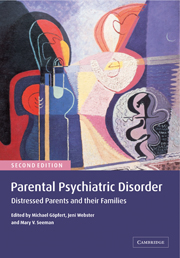Book contents
- Frontmatter
- Contents
- List of contributors
- Foreword
- Preface
- Part I Basic issues
- Part II Comprehensive assessment and treatment
- 6 ‘The same as they treat everybody else’
- 7 Formulation and assessment of parenting
- 8 Mentally ill mothers in the parenting role: clinical management and treatment
- 9 Perinatal mental illness: nature/nurture
- 10 Assessment and treatment issues when parents have personality disorders
- Part III Specific disorders: the impact on parent–child relationships
- Part IV Specific treatments and service needs
- Part V Child-sensitive therapeutic interventions
- Part VI Models for collaborative services and staff training
- Afterword
- Index
- References
9 - Perinatal mental illness: nature/nurture
from Part II - Comprehensive assessment and treatment
Published online by Cambridge University Press: 09 August 2009
- Frontmatter
- Contents
- List of contributors
- Foreword
- Preface
- Part I Basic issues
- Part II Comprehensive assessment and treatment
- 6 ‘The same as they treat everybody else’
- 7 Formulation and assessment of parenting
- 8 Mentally ill mothers in the parenting role: clinical management and treatment
- 9 Perinatal mental illness: nature/nurture
- 10 Assessment and treatment issues when parents have personality disorders
- Part III Specific disorders: the impact on parent–child relationships
- Part IV Specific treatments and service needs
- Part V Child-sensitive therapeutic interventions
- Part VI Models for collaborative services and staff training
- Afterword
- Index
- References
Summary
Not only do pregnancy and childbirth exert important psychological and physiological effects on a woman's life but a mother's pregnancy and postnatal difficulties impact indelibly on her child and, reciprocally, the temperament health and behaviour of the child impact on the mother's well-being. The psychological fit between the two, in the context of the larger family, carries significant implications for both (Oates, 1996, 2001). Childbearing is associated with a marked increase in the incidence and prevalence of psychiatric disorder although exact causal mechanisms (such as hormonal changes) remain unclear. Postnatal depression is extremely common, being consistently found in 10–15% of mothers (O'Hara & Swain, 1996). Acute postpartum affective or schizoaffective psychosis is less common, affecting about 1–2 in every 1000 deliveries. Though rare, these illnesses are severe and usually require hospitalization with consequent mother–child separation, unless mother and baby units are accessible. In addition, about 2% of pregnant women suffer from chronic severe mental health problems which are exacerbated postpartum (Kumar & O'Dowd, 2000).
This chapter explores how childbirth can contribute to the onset or exacerbation of psychiatric disorder and discusses the relative contributions of aetiological factors, including biological, environmental and psychosocial factors. The potentially serious effects of perinatal mental health problems require specialist clinical services (see Asen & Schuff, Chapter 10; Seeman, Chapter 11; Puckering, Chapter 12), including specialist inpatient facilities for joint admission of mother and baby. Women with mental health problems, unless supports are in place, will have difficulties in caring for their babies.
Keywords
- Type
- Chapter
- Information
- Parental Psychiatric DisorderDistressed Parents and their Families, pp. 123 - 138Publisher: Cambridge University PressPrint publication year: 2004
References
- 1
- Cited by

